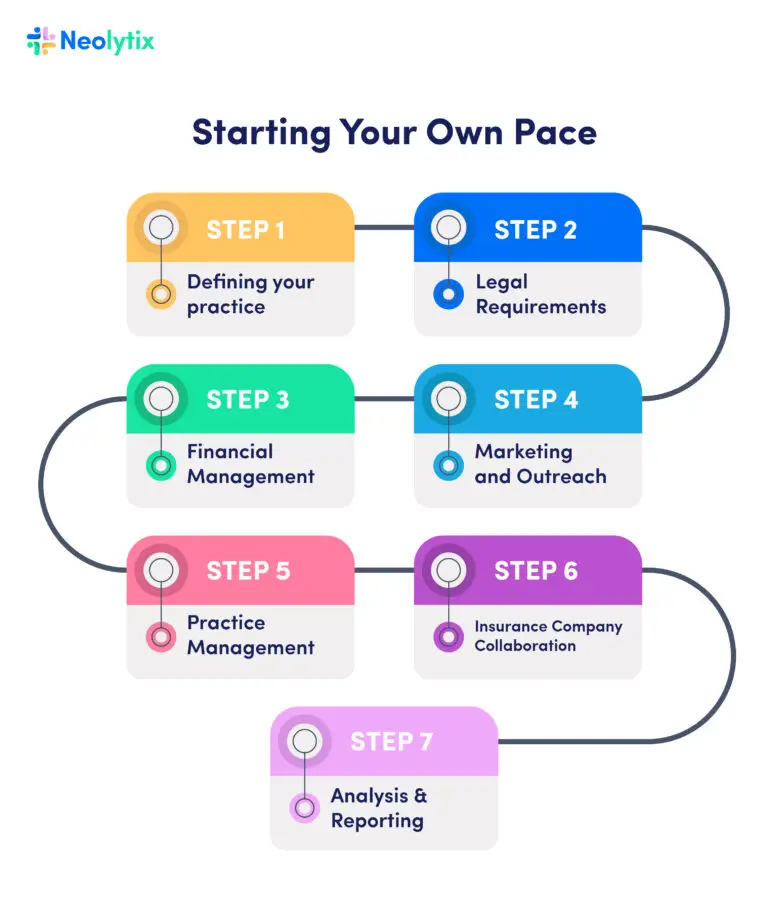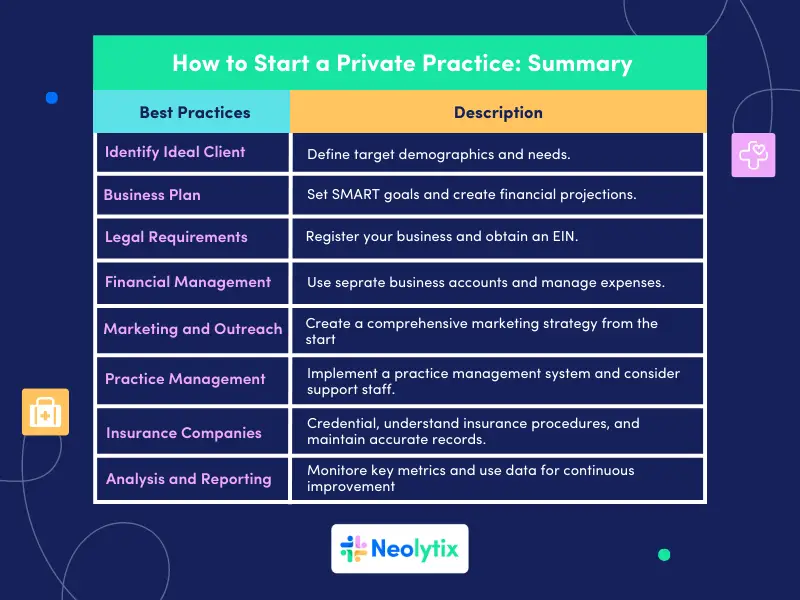For those who dedicate their lives to helping others navigate the intricate maze of mental health, the dream of owning a private therapy practice is nothing short of inspiring. However, beneath the surface of this noble journey lie challenges and uncertainties that can feel overwhelming. You’ve spent years honing your skills, acquiring knowledge, and gaining experience.
Now, the time has come to step into the role of a business owner and healer simultaneously.
The question that lingers is, how do you transform your passion for mental health into a thriving private practice that serves not only your clients but also your financial and professional aspirations? This is where a well-crafted business plan comes into play.
In this guide, we will not only provide you with a roadmap for writing a private practice business plan but also address the pain points and uncertainties that often accompany this transition. We’ll explore the key elements required to turn your dream into a reality, helping you navigate the complexities and build a foundation that ensures your success in the world of mental health entrepreneurship.
So, let’s take that inspiring step forward, address those uncertainties, and craft a private practice that thrives, heals, and fulfills your aspirations.

1. Defining Your Practice
Identifying Your Ideal Client
Before delving into the logistics of starting a private practice, it’s crucial to define your ideal client. Understanding who your therapy services are tailored for is the foundation of your practice. Consider factors such as age, gender, specific mental health needs, and the types of problems you’re best equipped to address.
This step will shape your practice’s direction and marketing strategy, ensuring you attract the right clients.
Creating a Business Plan
A well-structured business plan is your roadmap to success. Here’s what your plan should encompass:
- Vision and Mission: Clearly define your practice’s vision and mission. What is your long-term goal, and what values drive your practice?
- Goals and Objectives: Set specific, measurable, achievable, relevant, and time-bound (SMART) goals. Outline how you plan to achieve them.
- Financial Projections: Estimate your startup costs, projected revenue, and expenses. A detailed financial plan will help you secure financing and make informed financial decisions.
- Market Analysis: Research your competition and target market. Understand your competition’s strengths and weaknesses and identify opportunities in the market.
Selecting an Office Space
Choosing the right office space is vital for creating a comfortable and conducive environment for therapy sessions. Factors to consider include:
- Accessibility: Ensure that your office location is easily accessible to your target audience. A central, well-connected location can attract more clients.
- Privacy: Confidentiality is paramount in therapy. Select a space that guarantees privacy and minimizes distractions.
- Ambiance: The atmosphere of your office can significantly impact your clients’ experience. Create a calming, welcoming space that promotes a therapeutic environment.
2. Legal Requirements
Personal Asset Protection
By registering as an LLC or corporation, you separate your personal assets from your business assets. This means that if your practice faces legal issues or debt, your personal assets, such as your home and savings, are protected.
Credibility
A registered business conveys professionalism and credibility to potential clients and colleagues.
Tax Benefits
Different business structures have varying tax advantages. Consult with a tax professional to determine the best structure for your practice.
Obtaining an Employee Identification Number (EIN)
An EIN is a unique identifier assigned by the IRS to your business. It's crucial for tax purposes, especially if you plan to hire employees or operate as anything other than a sole proprietorship. You can apply for an EIN online through the IRS website.
Credibility
A registered business conveys professionalism and credibility to potential clients and colleagues.
Tax Benefits
Different business structures have varying tax advantages. Consult with a tax professional to determine the best structure for your practice.
Meeting Practice Management Regulations
Depending on your location and specialty, you may need to comply with specific practice management regulations. These could include:
- Licensing Requirements: Ensure that you have the necessary medical licenses and credentials to practice therapy in your state or country. Read more about medical licensing for you, your people and your practice here…
- Insurance: Consider obtaining professional liability insurance, also known as malpractice insurance, to protect yourself in case of legal claims.
- Ethical Guidelines: Familiarize yourself with the ethical guidelines and standards of your profession. Adhering to these standards is crucial for maintaining your reputation and avoiding legal issues.
3. Financial Management
Setting Up Business Bank Accounts
Separating your personal and business finances is essential for financial clarity and legal protection. Having separate accounts makes it easier to track business income and expenses, simplifying tax preparation and financial analysis. From a legal perspective, if your practice faces legal issues, having a separate business account can protect your personal assets from being seized.
Managing Business Expenses
Running a private practice involves various expenses, including:
- Office Rent: Calculate the cost of your office space, including rent, utilities, and maintenance.
- Therapy Equipment: Consider the expenses for furniture, therapy tools, and any technology needed for your practice.
- Electronic Health Records (EHR) Systems: Invest in a reliable EHR system to manage client records securely and efficiently.
- Marketing Costs: Budget for advertising, website development, and other marketing initiatives to attract clients.
- Credit Cards and Business Expenses: If you use credit cards for business expenses, manage them carefully to avoid accumulating debt. Set a budget and track your spending.
4. Marketing and Outreach
Crafting a Marketing Strategy
When starting a private practice, crafting a marketing plan right from the beginning offers numerous benefits that can significantly impact the success and growth of your therapy practice.
Here are six key advantages:
How To Start a Private Practice:
Benefits of Crafting a Marketing Strategy at the Start
Targeted Client Acquisition
By defining your target audience early on, you can tailor your marketing efforts to attract the clients who are most likely to benefit from your services. This leads to higher-quality leads and a greater likelihood of converting inquiries into clients.
Establishing Online Authority
Creating a professional website and maintaining an active online presence not only attracts potential clients but also establishes you as an authority in your field. When clients find a well-designed website with valuable content, they are more likely to trust your expertise.
Enhanced Visibility
Optimizing your website for search engines (SEO) increases its visibility on search engine results pages. This means that when potential clients search for mental health services in your area, your practice is more likely to appear at the top of the results, increasing the chances of getting noticed.
Content Marketing for Education
Developing a content calendar and regularly creating informative blog posts, videos, or podcasts not only engages your audience but also educates them. Providing valuable information demonstrates your commitment to mental health and helps potential clients understand your approach, increasing their trust in your practice.
Networking Opportunities
Attending industry events, joining professional organizations, and networking with colleagues opens doors to referral networks and collaborative opportunities. Building relationships with other professionals can lead to a steady stream of client referrals, especially when they trust your expertise.
Long-Term Growth and Sustainability
A well-crafted marketing strategy isn't just for the short term. It lays the foundation for long-term growth and sustainability. Consistent marketing efforts help you build a strong client base, allowing your practice to thrive well into the future.
A well-thought-out marketing strategy is crucial for attracting and retaining clients. Consider these steps:
- Target Audience: Define your target audience based on demographics, interests, and needs.
- Online Presence: Create a professional website that showcases your services, qualifications, and client testimonials. Ensure your website is user-friendly and optimized for search engines (SEO).
- Content Marketing: Develop a content calendar and create regular blog posts, videos, or podcasts that provide valuable information to your target audience.
- Networking: Attend industry events, join professional organizations, and network with colleagues to build a referral network.
5. Practice Management
Implementing a Practice Management System
Investing in a practice management system can streamline your administrative tasks and enhance the overall efficiency of your practice.
Key features to look for in a practice management system include:
- Appointment Scheduling: Manage client appointments, cancellations, and reminders electronically.
- Electronic Health Records (EHR): Store and manage client records securely, ensuring compliance with privacy regulations.
- Billing and Invoicing: Simplify the billing process, including insurance claims and client invoicing.
Hiring Support Staff
As your practice grows, you may consider hiring support staff to assist with administrative tasks. This can free up more of your time to focus on client care and business development.
Essential roles to consider could include receptionists managing client inquiries, appointment scheduling, and front desk duties. Billing specialists to handle insurance claims, billing, and financial record-keeping, and perhaps an office manager to oversee day-to-day operations and manage administrative staff.
The size of the practice will play the biggest role in the amount of support staff needed. But hiring people also means investing in equipment, training, etc. A way to keep the costs low at the start is to invest in virtual assistants (VAs). You can read more about the roles and benefits of VAs for therapists here.
Often, healthcare organizations partner up with an MSO (Management Services Organization) to help them take care of the non-clinical side of their business, allowing the healthcare providers to focus on providing excellent healthcare instead.
6. Dealing with Insurance Companies
Credentialing with Insurance Companies
Credentialing with insurance companies is crucial for healthcare providers, including therapists in private practice. It involves the verification and evaluation of a practitioner’s qualifications, licensure, and competence to provide services that can be reimbursed by insurance.
This rigorous procedure ensures that therapists meet specific standards set by insurance companies and regulatory bodies. Credentialing typically involves submitting documentation of one’s education, professional licenses, certifications, malpractice insurance, and references. Once approved, therapists become “in-network” providers, allowing them to accept patients with their respective insurance and receive reimbursement for covered services.
Being credentialed with insurance companies can expand a therapist’s client base and improve accessibility to mental health services. However, it also involves navigating each insurer’s administrative requirements and billing processes.
The credentialing process can be tedious and resource-intensive, so many providers outsource medical credentialing instead of dealing with the headaches themselves.
7. Analysis and Reporting
Monitoring and Reporting
Analyzing your private practice’s performance is crucial for growth and success. Regularly review key metrics and data to make informed decisions:
- Client Retention: Track client retention rates to understand the effectiveness of your services and client satisfaction.
- Revenue and Expenses: Monitor your practice’s financial health by tracking revenue, expenses, and profit margins.
- Marketing ROI: Evaluate the return on investment (ROI) of your marketing efforts. Determine which marketing channels are most effective in attracting clients.
- Appointment Scheduling: Analyze appointment scheduling data to optimize your availability and reduce no-shows.
- Feedback and Improvement: Collect client feedback through surveys or reviews to identify areas for improvement in your practice.
Summary

At Neolytix, we take immense pride in our 11+ years of dedicated support to practices across the country, nurturing them from the very grassroots of their journey. We understand that building a successful private practice in the field of mental health requires a solid foundation.
That’s why we’re here to offer you expert consultations and guidance to ensure your practice not only thrives today but lays the groundwork for future successes.
Let us be your partner in achieving your practice’s fullest potential. Contact us today to embark on a journey toward lasting success in your private practice.



